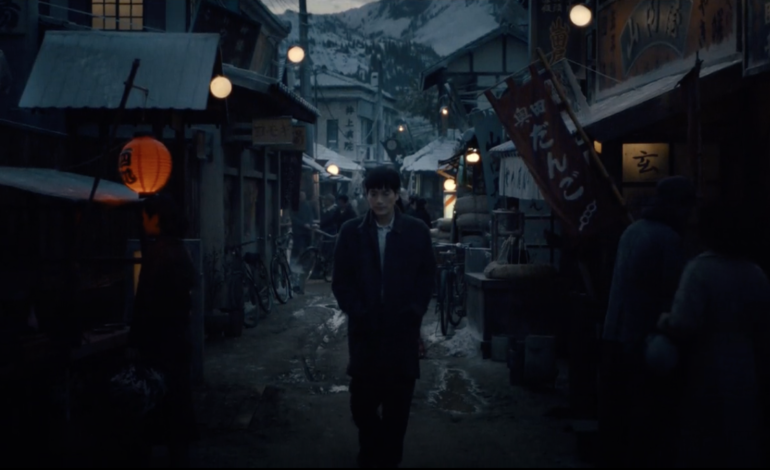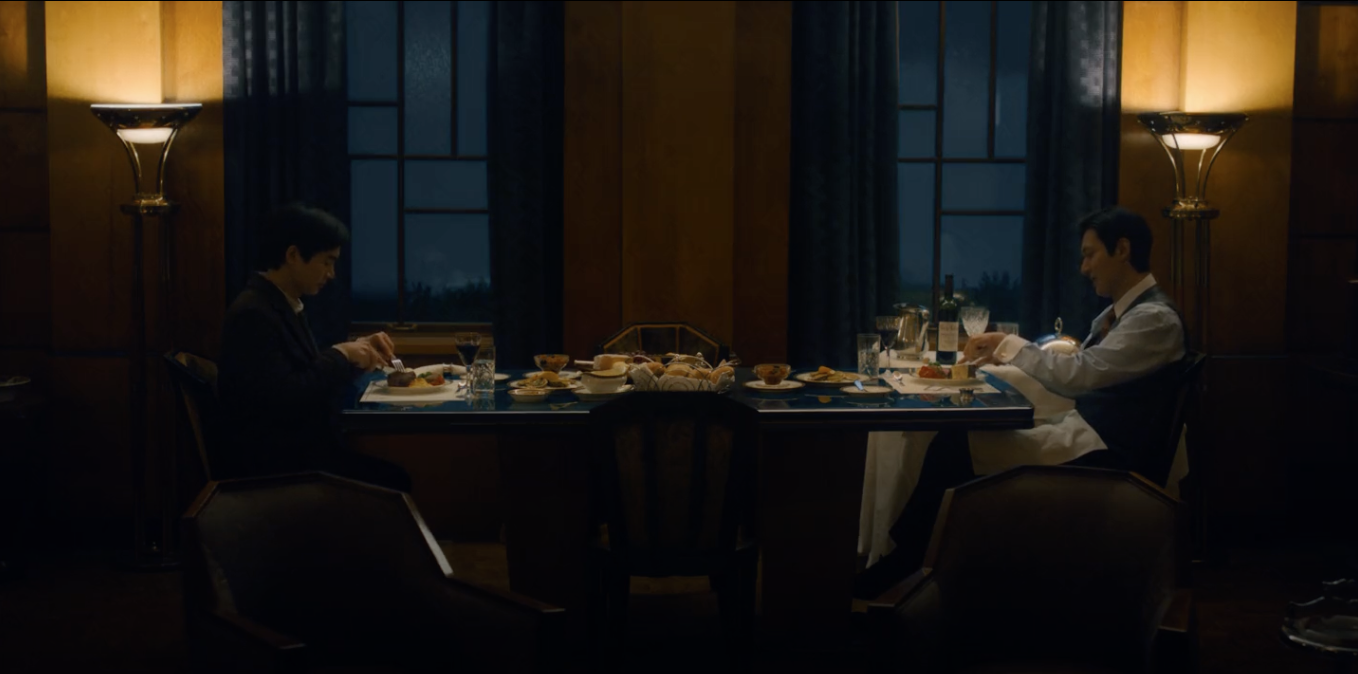

Season 2, Episode 8, titled “Chapter Sixteen,” of the Apple TV series, Pachinko, directed by Sang-il Lee and written by Chang-rae Lee, centers on Noa’s grief and estrangement from his family after learning the painful truth about his heritage as Koh Hansu’s illegitimate son. The episode delves deeply into the theme of consequences, exploring how the characters’ actions, both in the present and the past, shape their lives and those around them. This theme is embodied by Koh Hansu, Sunja, Noa, Solomon, Katsu Abe, and Kato, each of whom faces repercussions for their decisions.
Throughout the episode, it becomes clear that the characters are caught in the web of consequences spun from their past actions. Koh Hansu and Sunja’s relationship in Season 1 resulted in Noa’s illegitimate birth, a secret they both chose to keep from him for years. This decision, though made with the intention of protecting Noa, ultimately backfires, leading to his rejection of his family upon discovering the truth. Noa’s choice to abandon his family in response shatters the emotional bonds and forces Mozasu to bear the burden of ensuring his family’s survival without Noa’s support. Katsu Abe, who seeks to ruin Solomon’s reputation, pays the ultimate price for his actions, spiraling into financial ruin that eventually leads to his tragic suicide. Similarly, Solomon’s quest for revenge entraps him into a dangerous alliance with Mamoru Yoshii, leading to Abe’s death but also leaves Solomon isolated, alienating those closest to him, including Naomi.
The theme of consequences is further emphasized through Kato, whose dark military past as a war criminal continues to haunt him despite his efforts to lead a more virtuous life. Even years later, he cannot escape the shadow of his sins, as revealed when Sunja cuts ties with him after learning the truth through Mozasu’s investigation. Kato’s inability to find redemption reflects the idea that some actions carry lifelong consequences, no matter how much a person might seek forgiveness or attempt to atone for their wrongs.
The episode illustrates that every decision, whether made out of love, vengeance, or guilt, has far-reaching consequences. The characters’ choices ripple through time, affecting not just their own lives but also the lives of those around them. Hansu’s hidden past with Sunja leads to Noa’s lifelong struggle with identity and belonging, while Solomon’s drive for revenge results in his moral downfall and emotional isolation. The episode suggests that no matter how much one tries to control or undo the consequences of their actions, the impact remains, often in ways they least expect. The weight of unresolved guilt, untold truths, and unhealed wounds ultimately binds these characters to the inescapable outcomes of their decisions.


Noa’s Second Year at Waseda University
In 1951 Tokyo, Noa (Kim Kang-hoon) continues his second year at Waseda University without issues and begins dating Akiko Nakazono, a brilliant student from a wealthy Japanese family who aspires to become a sociologist. While Noa is thriving as a successful student with a promising career ahead, Mozasu (Mansaku Takada) is taking a completely different path, cheating at a pachinko parlor, much to the dismay of both the parlor’s owner, Goto (Hiro Kanagawa), and Mozasu’s mother, Sunja (Kim Min-ha). Despite Mozasu’s missteps, Goto is willing to forgive him, but only on the condition that Mozasu works in the pachinko parlor as punishment. What seems like a simple punishment leads to a growing friendship between Goto and Mozasu.


Noa and Hansu
Koh Hansu (Lee Min-ho) takes control of the Yakuza’s operations, including their involvement in the black markets and support for the Liberal Party. He meets with Kurogane, the leader of the Liberal Party, as they strategize ways to strengthen the party’s power and influence in Japan. Hansu later brings Noa into the fold, hoping to connect his biological son with Kurogane in order to secure a successful future for him. In other words, Hansu, in his own twisted and toxic way, wants the best for Noa by pushing him into politics.
During dinner, Noa tries to resist Hansu’s efforts to control how he lives his life since Noa wants to be a teacher, not a politician. This becomes significantly worse when the Yakuza boss invites Akiko and has her be involved in their argument. The moment becomes more heated when Akiko reveals to Noa that Hansu is his father and Hansu does not deny this. The truth horrifies Noa since he cannot believe he is the son of a Yakuza boss and that all his college money was given by a criminal who has hurt so many people in the past. As a result, Noa quits Waseda University and returns to Osaka to say farewell to his mother.


Noa’s Goodbye to Sunja
In Osaka, Sunja (Kim Min-ha) is stunned by Noa’s unexpected appearance, as he should be studying for his second year at Waseda University. Noa explains that he has come to see his mother one last time before leaving. After he departs, Sunja learns that this visit was truly his final goodbye. Panicked, she reaches out to Hansu for help, but he struggles to track their son’s whereabouts. In reality, Noa has relocated to Nagano, assuming the fake Japanese identity of “Ogawa Minato,” and is working as a bookkeeper and cleaner in a pachinko parlor—a striking parallel to Mozasu’s current job in Goto’s pachinko parlor in Osaka.
Despite Noa’s efforts to distance himself from Hansu, his actions come across as both unreasonable and selfish. By cutting ties with his family—a family that has spent years raising and supporting him with love—Noa chooses pride over connection. His behavior is reminiscent of Walter White, who similarly alienated everyone he cared for and threw away the chance for a successful and honest life, all in the name of pride, the most destructive of human sins.


Mozasu Confronts Mamoru Yoshii
In 1989 Osaka, Mozasu (Soji Arai) is stunned to receive a letter stating that all his loans have been paid off. Perplexed, he contacts the bank and learns that the money was transferred three days earlier by his son, Solomon (Jin Ha). Mozasu is confused, knowing that Solomon has been struggling to find a job, and wonders how his son could have earned such a large sum in such a short time. Determined to understand the situation, Mozasu decides to investigate, starting with attending his son’s conference and presentation in Tokyo about Mamoru Yoshii’s (Louis Ozawa) golf course.
In Tokyo, Solomon’s reputation has recovered, allowing him to confidently pitch Yoshii’s golf course to potential clients during the presentation. The exclusive golf course will be limited to 500 members, with only 47 spots available. Construction is set to begin within 90 days, with the course expected to open for its members by next summer. Although clients raise concerns about potential financial issues, Solomon reassures them that Japan’s robust and enduring economy will ensure the project’s success, even expressing hope that Japan’s economy may one day surpass that of the United States. His confident assurances please the clients eager to hear more about the luxurious golf course.
Mozasu arrives at the conference on time and is shocked to discover that Mamoru Yoshii, a man with whom he has a complicated past, is Solomon’s new boss. Disturbed by this, Mozasu confronts Yoshii in his office, urging him to sever ties with his son. However, Yoshii refuses, claiming that Solomon is a valuable employee who helps him make substantial profits. During the conversation, it is revealed that Mamoru’s grandfather, Isamu Yoshii, favored Mozasu over Mamoru, leading to years of jealousy. As a result, Solomon has become more of a pawn for Mamoru, who can manipulate his life and reputation at will.
Mozasu reminds Mamoru of the mercy he once showed him in the past and pleads for the same consideration, warning that if Mamoru doesn’t relent, Mozasu will do whatever it takes to bring him down. While the exact nature of their history remains unclear, it is strongly implied that Mozasu was once part of the Yakuza, like Mamoru, holding a high-ranking position before leaving. This is plausible given the well-known ties between Japan’s pachinko parlors and the Yakuza, who often fund and support such establishments.


Solomon’s Guilt
Solomon celebrates his victory over Katsu Abe with Tom Andrews (Jimmi Simpson) at a bar, when Tom reveals his plans to work under Mamoru Yoshii in Macau instead of returning to the U.S. This shocks Solomon, who expected Tom to be eager to reunite with his children. However, Tom dismisses the concern, stating that his kids have grown up and managed without him, revealing how power has clouded his priorities, distancing him from his family.
As time passes, Solomon is further stunned to learn that Katsu Abe has committed suicide due to severe debt. What initially felt like a victory now leaves Solomon filled with remorse, realizing he is indirectly responsible for Abe’s death. His thirst for revenge is replaced by guilt. With Tom consumed by power and Naomi’s fate uncertain, Solomon finds himself alone, grappling with the consequences of his actions. His future looks increasingly precarious as he begins employment under Mamoru Yoshii, a ruthless man willing to harm and discard anyone who fails him.


Sunja Talks with Kato
Sunja (Youn Yuh-jung) meets her friend Kato Tatsumi (Jun Kunimura) at a café in Osaka. However, the conversation takes a dark turn when Sunja confronts Kato about Mozasu’s investigation, revealing that Kato was once a Japanese soldier involved in the war crime of killing American POWs. Kato, filled with genuine remorse, admits his past wrongdoings and explains that he has been striving to live as a better person ever since. Despite his regret, Sunja tragically pushes him away, leaving the elderly man heartbroken. Sunja’s actions feel unjust, as Kato, in his quest for redemption, deserves empathy to help him find peace, rather than being burdened with more guilt.
Rating: 9/10
